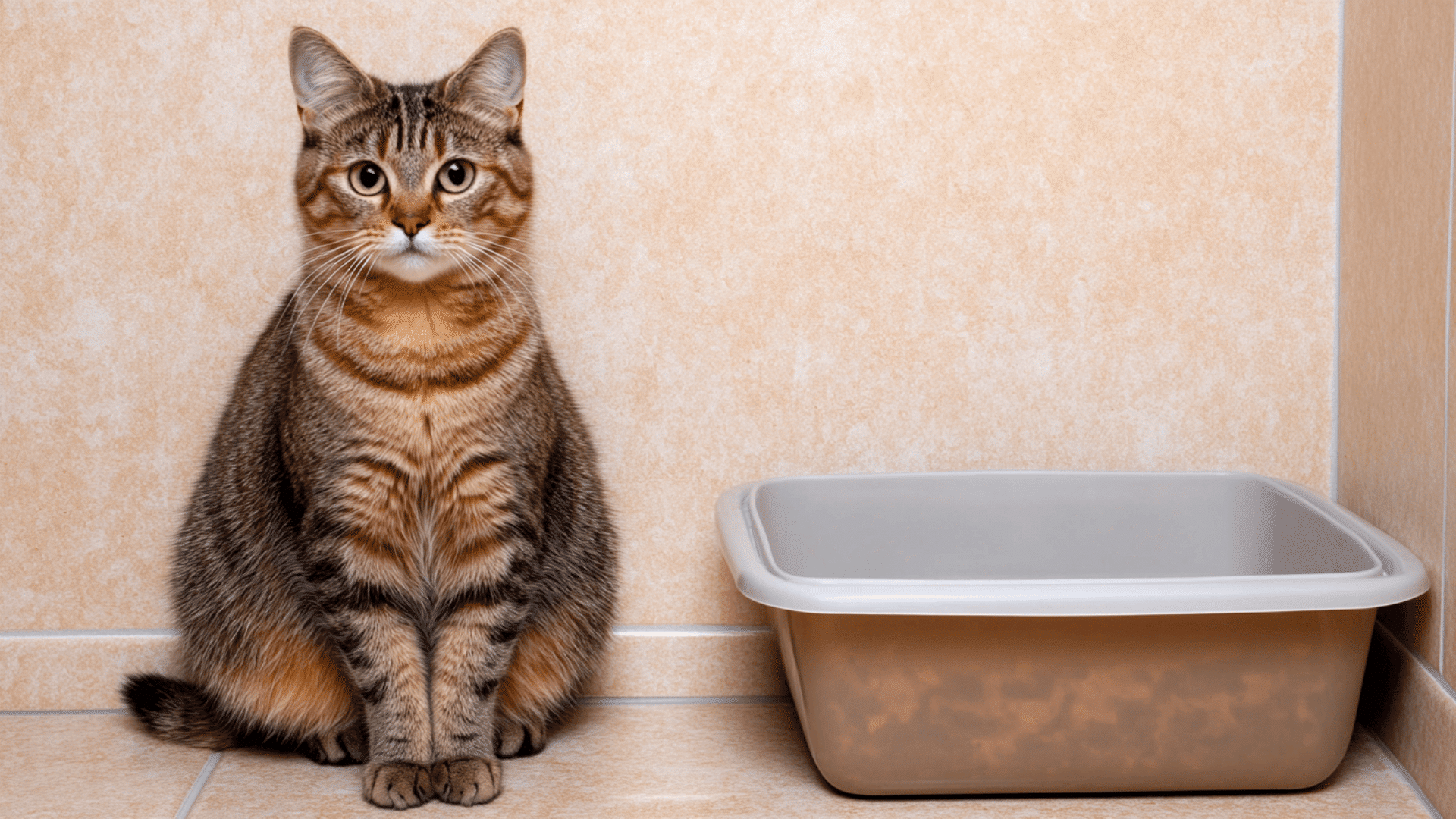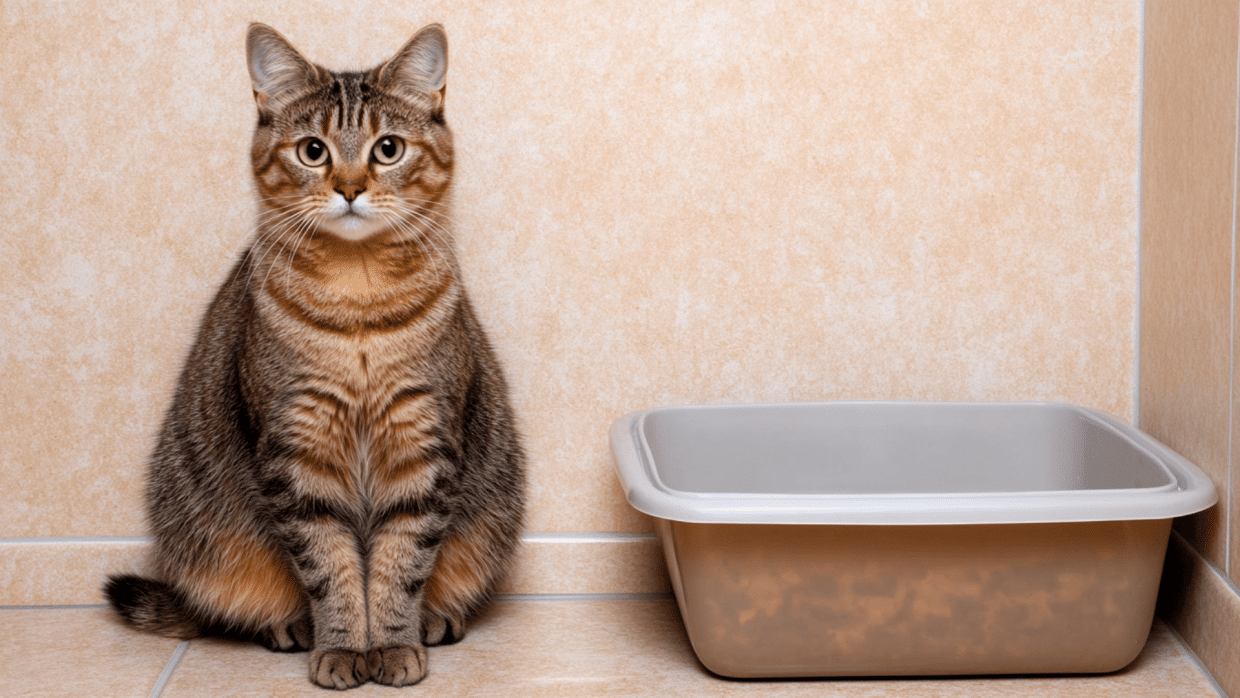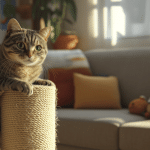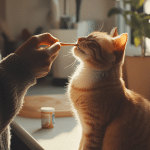
- arrow_back Home
- keyboard_arrow_right Cat Health & Wellness
Cat with Diarrhea: Causes & Quick Relief Tips

Cat Health & Wellness Amelia Tate April 25, 2025
Is your cat suddenly having messy bathroom habits? It can be worrying and confusing when your cat has diarrhea out of the blue. You might wonder what caused it, if it’s serious, and how to help them feel better fast.
This blog is here to make things simple. We’ll explain why a cat with diarrhea might not always be an emergency, but when it can be. You’ll learn the common causes, safe home remedies, and signs to watch out for.
By the end, you’ll know exactly what to do and when to call the vet.
Ready to figure out what’s going on with your cat’s tummy troubles? Let’s get into it.
Is My Cat’s Diarrhea a Problem?
Not all soft stools are a big deal, but some are. The first step is knowing what’s normal and what’s not when it comes to your cat’s poop.
What Healthy vs. Unhealthy Poop Looks Like
Healthy cat poop is:
- Firm but not hard
- Shaped like a log or small nugget
- Medium to dark brown in color
- Easy to scoop and doesn’t leave residue
Unhealthy poop may look like:
- Watery or loose puddles
- Very soft with no shape
- Green, yellow, or black in color
- Greasy, sticky, or very smelly
If your cat’s stool has blood, mucus, or a strong foul smell, it may point to a more serious issue.
Stool Chart to Help You Understand
Use this chart to compare your cat’s poop:
| Type | Appearance | What it Might Mean |
|---|---|---|
| Firm and brown | Normal | Healthy |
| Soft and formed | Slight diet issue | Monitor, may resolve on its own |
| Loose and shapeless | Mild diarrhea | Keep an eye, may need diet change |
| Watery and frequent | Severe diarrhea | Needs quick attention |
| Bloody or black | Possible internal issue | Call your vet |
This can help you decide whether it’s just a one-time thing or a sign of something bigger.
How to Track Frequency and Consistency
To know if things are getting better or worse, start a simple log:
- Note the number of times your cat poops each day
- Check if the stool is getting firmer or looser
- Watch for changes in color, smell, or signs of pain
You can use a notebook or a phone app to keep track. This info is helpful if you need to call the vet.
Even mild diarrhea can become serious if it lasts too long, so tracking helps you stay ahead of it.
Common Causes of Diarrhea in Cats
Diarrhea in cats can happen for many reasons. Some are minor and go away fast. Others may need treatment. Understanding the cause can help you know what to do next.
1. Sudden Diet Changes
Cats have sensitive stomachs. If you switch their food too quickly, it can upset their digestion. Even changing brands or adding new treats can lead to loose stool.
To avoid this, always mix the old food with the new over several days. A gradual change gives their system time to adjust.
2. Parasites and Infections
Parasites and infections are common reasons for diarrhea, especially in outdoor cats or kittens. Your cat might pick up parasites like roundworms or giardia from dirty water or soil.
Parasites like roundworms can cause serious stomach problems in cats, especially kittens. If left untreated, they can even lead to life-threatening issues. Learn how roundworms can affect your cat’s health.
Infections caused by bacteria or viruses can also affect their gut. These types of issues often require a vet to test the stool and give the right treatment.
3. Allergies or Intolerances
Food allergies or intolerances can lead to ongoing or repeat diarrhea. Your cat may react badly to certain ingredients like chicken, dairy, or grains.
You might also notice vomiting, itchy skin, or gas. In these cases, your vet may suggest a special diet to figure out what’s causing the problem.
4. Stress (e.g., travel, new pet)
Stress affects cats more than we realize. Moving to a new home, traveling, or adding a new pet can all trigger stomach problems.
Even loud noises or changes in routine can lead to diarrhea. If the issue starts right after a change in your cat’s environment, stress is likely the reason.
5. Underlying Conditions
Some health issues show up first as diarrhea. Conditions like inflammatory bowel disease, pancreatitis, or liver problems can cause frequent or long-term stomach trouble.
These are often paired with other symptoms like weight loss, vomiting, or poor appetite. If diarrhea lasts more than a few days or keeps coming back, it’s best to talk to your vet.
Even though diarrhea may seem simple, the cause behind it can be very different. Spotting the pattern early helps you take the right steps to get your cat feeling better.
Home Remedies for Mild Cases
If your cat seems healthy but has mild diarrhea, you may be able to treat it at home. Just be sure your cat is eating, drinking, and acting normal. If things don’t improve in a day or two, contact your vet.
Temporary Bland Diet (Boiled Chicken and Rice Alternatives)
Start by switching to a bland, easy-to-digest diet. This helps calm your cat’s stomach and gives their gut a break.
Boiled, skinless chicken is a good option. You can mix it with plain pumpkin puree or a bit of white rice.
Some cats do better with boiled turkey or baby food made from only meat and broth. Avoid anything with seasoning, onions, garlic, or added fats.
Feed small portions throughout the day. Once the stool firms up, slowly reintroduce your cat’s regular food over 3–5 days.
Probiotics and Hydration
Probiotics help restore healthy gut bacteria. You can use ones made for cats or ask your vet for a recommendation. These come in powders, capsules, or treats.
Keeping your cat hydrated is just as important. Diarrhea can lead to dehydration. Offer fresh water often.
If your cat isn’t drinking much, try offering a little low-sodium chicken broth or ice cubes made from tuna water to spark interest.
When to Skip Feeding for 12–24 Hours
In some cases, a short break from food can help. If your adult cat is otherwise healthy, you can skip feeding for 12 to 24 hours. This gives the digestive system time to reset.
Always keep fresh water available. Do not try this with kittens, seniors, or cats with health issues—they need regular nutrition.
After the fasting period, start the bland diet and monitor your cat’s behavior and poop.
Safe OTC Options
Most over-the-counter human medicines are not safe for cats. Never give your cat anything without asking your vet first.
There are a few feline-specific products, like anti-diarrheal pastes or fiber supplements, that might help. These are usually safe in small amounts, but it’s best to check with your vet for the right brand and dose.
Home care works for many mild cases, but if symptoms don’t improve or if your cat starts acting differently, get professional help. It’s always better to be safe.
When to Call the Vet

Some cases of diarrhea go away on their own. But others may point to something more serious. Knowing when to get help can make a big difference for your cat’s health.
Warning Signs: Blood, Mucus, Vomiting, Lethargy
If you see blood or mucus in your cat’s poop, it’s time to call the vet. These signs may point to infection, parasites, or even internal damage.
Vomiting along with diarrhea is also a red flag. If your cat seems tired, weak, or stops eating, don’t wait. These symptoms could mean something more than just an upset stomach.
It’s better to get help early than to wait and risk things getting worse.
Duration Guidelines: 24 Hours vs. 48 vs. a Week
Mild diarrhea that lasts less than 24 hours and doesn’t come with other symptoms is usually not urgent. You can try home care and keep an eye on things.
If diarrhea lasts more than 48 hours or gets worse, call your vet. A full week of diarrhea, even if mild, is not normal and should be checked out.
Also, if diarrhea stops and then comes back again, that’s another reason to get it looked at.
What Your Vet Will Likely Ask
When you talk to the vet, they’ll want to know:
- What your cat has been eating
- If there were any changes in diet or treats
- How the poop looks: color, texture, smell
- If your cat is acting differently or has other symptoms
It helps to write down this information ahead of time. You can even take a photo of the stool to show the vet.
Being prepared helps your vet find the cause faster and get your cat the right care.
Treatment Options from the Vet
If your cat’s diarrhea doesn’t improve or comes with other symptoms, your vet may need to step in. They’ll work to find the cause and provide the right treatment to help your cat recover.
Common Diagnostic Tests
The first step is usually a stool test. This checks for parasites, bacteria, or viruses. It’s quick and easy, and can often give answers within a day or two.
Your vet may also suggest bloodwork to check for organ problems or infection. In some cases, they might recommend an ultrasound or X-ray to look for issues inside the stomach or intestines.
These tests help rule out serious conditions and guide the best treatment plan.
Medications, Prescription Food, Fluid Therapy
Based on the cause, your vet may prescribe different treatments. If parasites or bacteria are found, they’ll give your cat dewormers or antibiotics.
Cats with food sensitivities or IBD may need prescription food that’s easier to digest. These diets are made to reduce inflammation and support gut health.
If your cat is dehydrated, they might need fluids. This can be done at the clinic or, in some cases, with fluids given at home under the skin.
All these treatments are aimed at getting your cat stable, comfortable, and back to normal.
Cost Expectations
Costs will vary depending on your cat’s condition and the clinic, but here’s a general idea:
- Vet visit: $40 to $150
- Stool test (fecal exam): $45 to $90
- Bloodwork: $100 to $300
- Ultrasound: $200 to $500
- Prescription food: $35 to $75 (dry), $2.50 to $3.50 per can (wet)
- Medications: $20 to $100+
- Fluid therapy: Around $25 per treatment
These are average ranges. Your vet can give a more exact estimate based on your cat’s needs. Getting care early often prevents more expensive treatments later.
Chronic or Recurring Diarrhea
If your cat keeps having diarrhea, or it goes away and comes back often, there may be a deeper issue. Ongoing stomach problems usually need a long-term plan to manage.
Causes (IBD, Parasites, Allergies)
Chronic diarrhea is often caused by conditions that affect the gut over time. Inflammatory Bowel Disease (IBD) is one of the most common. It causes long-term inflammation in the intestines and leads to frequent diarrhea, weight loss, or vomiting.
Parasites like giardia or coccidia can also cause repeat issues if not fully treated. These may not always show up in a single stool test, so your vet might need to test more than once.
Food allergies or sensitivities are another cause. Your cat may react to certain proteins, grains, or additives in their regular food.
Long-Term Management Plans
Managing chronic diarrhea takes time and patience. Once your vet figures out the cause, they’ll help create a plan that may include:
- Prescription food that’s gentle on the stomach
- Regular use of probiotics
- Anti-inflammatory medications for IBD
- Repeat deworming if parasites are the issue
Follow-up visits may be needed to check how your cat is doing and adjust the plan as needed.
Diet Trials and Elimination Diets
If food is the suspected cause, your vet may suggest a diet trial. This means feeding your cat a simple, limited-ingredient or hydrolyzed protein diet for 6 to 8 weeks.
During this time, it’s important not to give any treats, table scraps, or flavored meds. This helps see if the diet alone improves your cat’s digestion.
If symptoms go away, you may slowly reintroduce foods to find the exact trigger. This process takes time but can lead to lasting relief.
Chronic diarrhea doesn’t have to be a lifelong struggle. With the right care and attention, most cats can feel much better and live comfortably.
Special Cases – Kittens, Seniors, and Multi-Cat Homes
Diarrhea can be more dangerous in certain cats, especially if they’re very young, older, or live in a household with multiple pets. These situations need extra care and attention.
Why Diarrhea is Riskier for Kittens
Kittens have tiny bodies and weak immune systems. Even a short bout of diarrhea can lead to dehydration fast. They also lose nutrients quickly, which can slow growth or cause serious problems.
If a kitten has diarrhea for more than a few hours or also shows signs like vomiting or refusing food, call your vet right away. Kittens often need quicker care than adult cats.
Age-Related Vulnerabilities
Senior cats may already have health conditions like kidney disease, arthritis, or digestive problems. Their bodies don’t bounce back as quickly, and diarrhea can worsen any existing issues.
Older cats also lose fluids more easily and may not drink enough water to stay hydrated. If your senior cat has diarrhea, even if it seems mild, it’s best to talk to your vet sooner rather than later.
Tips for Isolating and Monitoring in Multi-Cat Homes
In homes with more than one cat, it can be hard to tell who’s sick or how often they’re using the litter box. To manage this:
- Try to keep the sick cat in a separate room with its own litter box and food
- Check the litter regularly to track stool changes
- Wash your hands after handling the sick cat to prevent spreading germs
- Don’t let other cats use the same bowls or boxes until things improve
Keeping a close eye helps stop the problem from spreading and makes it easier to monitor recovery.
With the right setup and quick action, you can keep all your cats safe and comfortable, even in special situations like these.
Preventing Future Episodes
A few simple habits can help reduce the risk of diarrhea returning.
- Food: Always transition to new food gradually over 7 to 10 days. Sudden changes can upset your cat’s stomach and trigger loose stools.
- Treats: Avoid giving your cat dairy, fatty meats, or anything seasoned. These can cause digestive issues even in small amounts, especially if your cat isn’t used to them.
- Safety: Choose plain, limited-ingredient treats made for cats. Introduce new treats slowly, and keep portions small to see how your cat reacts before offering more.
- Deworming: Stick to a regular deworming routine based on your vet’s advice. Parasites can be a hidden cause of recurring diarrhea, especially in outdoor or multi-pet homes.
- Vet: Schedule yearly checkups and stool tests, even if your cat seems healthy. Early detection of issues can help prevent long-term digestive problems and catch hidden causes.
These habits keep your cat’s digestion steady and help prevent future flare-ups.
Conclusion
If your cat has diarrhea, now you know what to look for, what to try at home, and when it’s time to call the vet.
Even mild cases need attention, and small changes can make a big difference. Use what you’ve learned to spot warning signs early and help your cat feel better faster.
Remember, healthy habits like slow food changes and regular vet checks go a long way in preventing future issues.
Keep an eye on your cat’s behavior, trust your gut, and don’t wait too long to get help if needed.
Curious about more cat care tips? Check out our other blogs for easy-to-follow advice on common cat health questions and everyday pet care.


Dedicated to cat health, behavior, nutrition, and happy pet parenting.
Copyright © 2025 Archiecat.com




Be the first to leave a comment